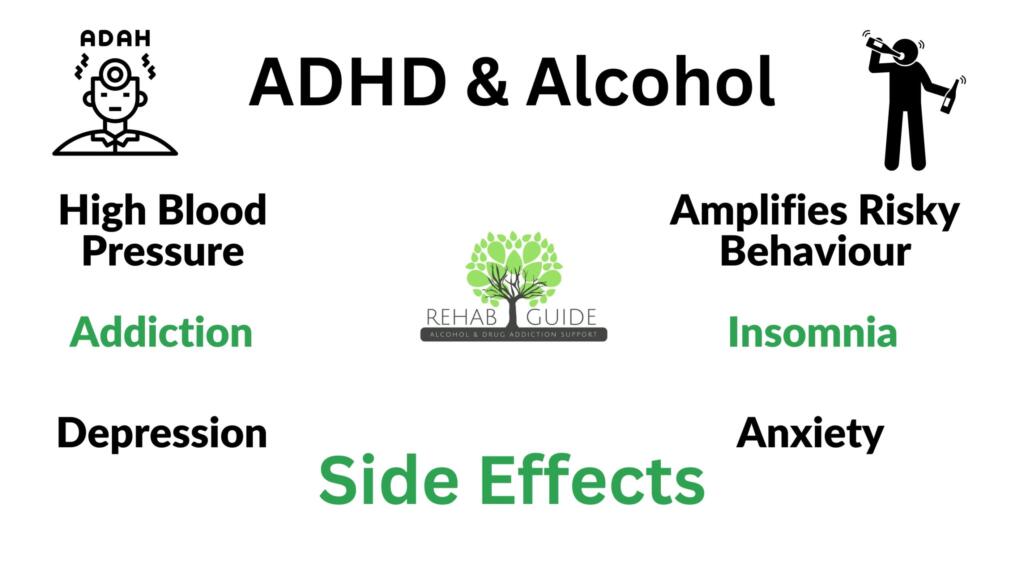Alcohol and ADHD commonly occur together, presenting a complex challenge for those affected.
The presence of alcoholism often exacerbates the symptoms of ADHD and vice versa, creating a cycle that can significantly impact overall well-being and quality of life.
What is ADHD?
ADHD, also referred to as Attention-Deficit Hyperactivity Disorder, is a condition marked by a persistent lack of focus and excessive activity.
ADHD is a condition that hampers the ability to concentrate on tasks and leads to easy distractions.
It is hypothesised that this disorder is caused by reduced activity in the brain’s frontal lobe. Imaging studies have even indicated a smaller size of the Prefrontal Cortex in individuals with ADHD.
This region of the brain plays a crucial role in our cognitive functions, including executive functions such as:
- Cognitive processes
- Analytical thinking
- Focus
- Memory
- Organisation
Relationship Between alcohol and ADHD
The combination of alcohol and ADHD can be perilous and often results in reliance and addiction.
ADHD is a disorder that is being diagnosed more frequently. Nevertheless, not all individuals diagnosed may genuinely experience ADHD, and the same applies vice versa. However, the most concerning aspect is that individuals with ADHD are more prone to developing alcoholism.
Effects of Combining Alcohol and ADHD
When someone is already struggling with ADHD, the consumption of alcohol can worsen their attention span, impulse control, and hyperactivity.
Alcohol acts as a depressant on the central nervous system, further impairing the individual’s ability to concentrate, organise thoughts, and complete tasks. It can also increase restlessness and impulsivity, making it even more challenging to manage ADHD symptoms effectively. Likewise, those with ADHD may turn to alcohol as a way to self-medicate and alleviate their symptoms temporarily. They may feel that alcohol helps them relax, quiet their racing thoughts, or cope with the challenges they face due to ADHD. However, this reliance on alcohol as a coping mechanism can quickly develop into a harmful pattern of addiction, leading to numerous negative consequences in their lives.
Risks of Mixing Alcohol and ADHD
The mixing of alcohol, especially alcohol addiction and ADHD, can create a vicious cycle.
Alcoholism can exacerbate the symptoms of ADHD, leading to increased difficulties in functioning and managing daily responsibilities. This, in turn, can contribute to feelings of frustration, low self-esteem, and even depression, which may further fuel the desire to turn to alcohol for relief.
The cycle continues as alcohol abuse worsens ADHD symptoms, and the worsening symptoms drive the individual to consume more alcohol as a coping mechanism.
The risks of mixing alcohol and ADHD are high and can vary from one person to the next; here are some of the risks associated with mixing alcohol and ADHDL
Amplifies risky behaviours: the potential for an individual to engage in activities with a higher level of risk or danger increases when alcohol is mixed with ADHD. This could include behaviours such as reckless driving, substance abuse, or participation in dangerous activities.
Exacerbating physical and mental health problems: the presence of ADHD can worsen pre-existing physical and mental health conditions. For example, those mixing alcohol with ADHD may experience increased levels of stress, anxiety, or depression, which can negatively impact their overall mental well-being. Additionally, the symptoms of ADHD, such as impulsivity and difficulty focusing, can also make it more challenging to manage physical health conditions, leading to a potential exacerbation of symptoms or complications.
Negative interactions with ADHD medications: the medications prescribed to manage ADHD symptoms may have adverse effects when consuming alcohol or other substances.
Some individuals may experience side effects from ADHD medications, such as increased heart rate, sleep disturbances, or changes in appetite. Overall, the result of these factors is a potential amplification of both physical and mental health issues for individuals with ADHD.
Individuals with ADHD must work closely with healthcare professionals to monitor their symptoms, manage any potential risks or interactions, and develop strategies to address these challenges effectively.
Alcohol and ADHD Medication
Numerous additional factors play a role in how your body responds to alcohol when you are on ADHD medication. Some of these factors include the amount of medication you take and whether it is a fast-acting or slow-acting medication. In general, it is advisable to refrain from consuming alcohol, particularly in excessive amounts, while taking ADHD medication. However, it may be acceptable to have a drink occasionally.
If you have concerns about the potential impact of alcohol on your ADHD medication, it is recommended to discuss this with your doctor.
Why People with ADHD are Turning to Alcohol
Those suffering from ADHD require continuous stimulation.
The aspect of their condition that causes them to be “hyperactive” makes it challenging for them to concentrate on uninteresting tasks, prompting them to seek out their own sources of stimulation.
In the case of children, this often manifests as an inability to focus on anything other than play. This is particularly evident in a classroom environment, where they are expected to remain quiet and seated for extended periods of time.
In the case of adults, there is naturally less supervision, allowing them to satisfy their craving for thrills without facing similar repercussions; this is one of the factors that lead them to resort to alcohol. Nonetheless, due to the way alcohol and ADHD interact, a risky pathway of diminished self-control and memory lapses awaits. Additionally, the likelihood of substance misuse escalates as they grow older.
Statistics on Alcohol and ADHD
Around 25% of adults receiving treatment for alcohol and substance use disorders have been diagnosed with attention-deficit/hyperactivity disorder (ADHD).
Those with ADHD during childhood have a higher likelihood of engaging in alcohol abuse during their teenage years and carrying this dependency into adulthood.
The comparable effects of alcohol and ADHD can make it more challenging for those with ADHD to cease drinking once they start.
Although alcohol may appear to alleviate symptoms of ADHD, particularly for those struggling with self-confidence, the negative consequences of regular alcohol consumption accumulate over time. Whenever we resort to alcohol as a means of self-medication, we are invariably more susceptible to developing a dependency and eventually an addiction compared to others.
Andy Mac – My experience with alcohol and ADHD Andy Mac, a DJ and producer, discusses his experience with ADHD and alcohol, highlighting how he has achieved better physical and mental well-being after being diagnosed and taking charge of his drinking:
“It’s easy for ADHD sufferers to get locked into a cycle of drinking. It goes like this. After a binge drinking session, you wake up with the fear. You feel guilty. Or depressed. Or anxious. Or all three. You find it hard to stay still or focus on anything because the thoughts of what you think you’ve done the night before are playing in paranoid HD in your head. It’s overwhelming. You may just stay like this in torment, or you might have a drink to deal with the feelings. Over and over, this happens.”
“I didn’t get diagnosed until after I gave up drinking a couple of years ago. I was found to be suffering from ADHD (inattentive subtype). This means that I’m not hyperactive, but I have other symptoms. I zone out and stop following conversations. I procrastinate to world record levels, and I get easily distracted. I now take medication which helps reduce these symptoms, and I’m amazed by how well it works.” 
Help for Alcoholism and ADHD
At Rehab Guide, we feel that addressing the co-occurrence of alcohol addiction and ADHD requires a comprehensive and integrated approach.
Treatment should focus on both conditions simultaneously, considering the unique challenges presented by each. This may involve a combination of therapies, such as medication management, behavioural therapy, counselling, support groups, and educational interventions. Furthermore, it is crucial to address any underlying factors that may contribute to the development of both alcohol addiction and ADHD, such as genetic predispositions, environmental influences, and co-occurring mental health disorders. By addressing these factors, individuals can receive the necessary support and resources to manage both conditions and improve their overall well-being effectively. In conclusion, the co-occurrence of alcohol addiction and ADHD is a common and challenging phenomenon.
The presence of alcoholism tends to worsen the symptoms of ADHD, while ADHD may increase the risk of developing alcohol addiction. Recognising and addressing this co-occurring condition is essential to provide individuals with the appropriate interventions, support, and resources needed to manage both conditions and
How Rehab Can Help
People with ADHD who are looking for rehab for alcohol problems will be looking for a centre that caters to their personal needs. It is important to find a clinic with a specialist doctor who will be able to give advice about medications and detox.
A dual diagnosis of mental health conditions that can often contribute to people with ADHD addictions is also an essential feature in any rehab you choose.
Considering all of the potential treatments mentioned above, Rehab Guide specialises in helping you find the treatment you need, whether local or elsewhere in the UK.
By contacting our support team through phone, email or online chat, we can get you on the right track to recovery while establishing a plan to help you stay sober. Also, we recommend downloading our information brochure if you want more information before contacting us.
Sources
https://www.ncbi.nlm.nih.gov/pmc/articles/PMC6683828/ The Clinically Meaningful Link Between Alcohol Use and Attention Deficit Hyperactivity Disorder

Fiona Kennedy is an editor and content manager who earned her Master of Arts degree from the University of Edinburgh, followed by completing the CELTA Cambridge teaching course in English. She has worked as an editor, writer and personal coach. Coming from a family deeply involved in the rehabilitation and support of those suffering from addiction, she is passionate about helping people to understand and take control of their dependences. Fiona’s other passions include travelling and taking part in community projects.


